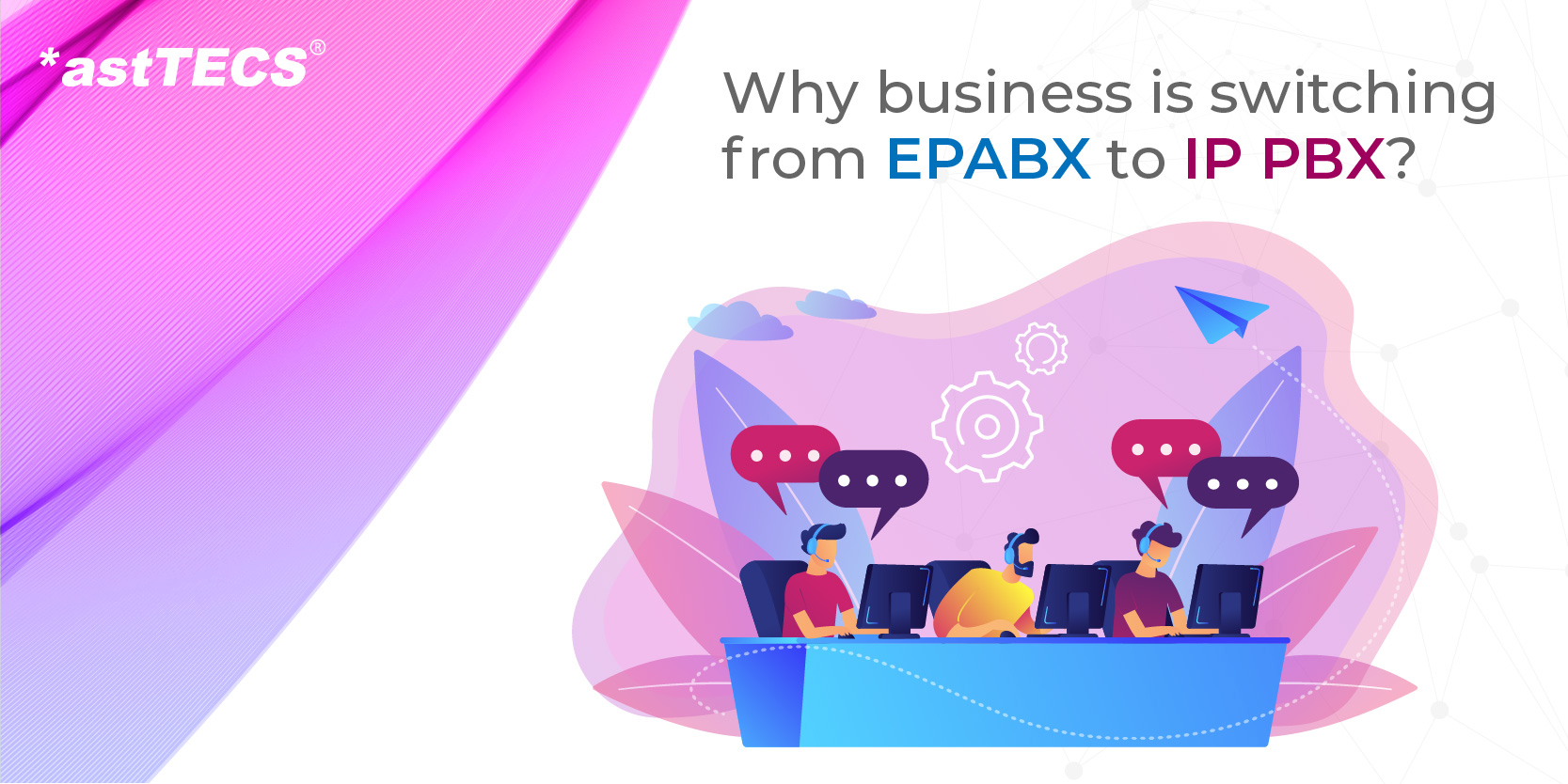Why Business shift from EPABX to IP PBX
Introduction
Business phone system is one of the best ways businesses can function effectively and improve brand communication with customers. It lets you establish authority in your space, build a relationship with clients, and make internal communication smooth.
One such evolution has also entered the PBX methodology or, more popularly known as Private Branch Exchange. It is undeniable that the still used EPABX or Electronic Private Automatic Branch Exchange, holds a fair use case in the market today, even being decades old. These run on Plain Old Telephone Service (POTS), built on copper wires.
The industry is advancing towards the cloud to lower its infrastructural cost, which also, in turn, has led to a newly developed, Internet Protocol Based PBX. It is the fight between the new God and the old gods. EPABX v/s IPPBX is a battle to watch out for!
Hold on to your arguments because we have a considerable duel in mind! Let’s understand the resilience of both the PBXs.
What led to the rise of EPABX?
Internal Communication Solution: EPABX was developed to solve the problem of internal communication within organizations. The call is routed internally to the person of want without incurring extra charges or wait time.
Ease Of Control: EPABX. Offered centralized controls to allow all calls entering the front office through a single contact number and routed seamlessly to the responder. The EPABX is also enabled with features such as Welcome Message, Interactive Voice Responses, etc. There is also Call Parking functionality, which allows you to hold a line until the responder is busy, along with the Call Transfer Facility.
Automated IVR: This was one of the PBX breakthrough features, so as not to have to employ a person to answer and route calls. The response mechanism records give the instructions to dial the number of the specific service.
Call Monitoring: All incoming and outgoing calls are logged and even recorded for training, quality check, and betterment of service purposes.
Variable Access: This functionality allows us to customize the communication line as per the needs. The PBX control units permit you to give different levels of access to other extensions. Restrict access to long-distance calls or international dialing is one such important customization access option.
Pros and Cons of EPABX:
The advent of EPABX led to a huge change in business working styles. Some, Fundamental factors that attracted businesses towards EPABX are,
| Pros: | Cons: |
| 1. Cost Reduction: | 1. Customer service is handicapped: |
| 2.Flexibility: | 2. Constant power supply: |
| 3. Sharing of resources: | 3. Does not provide communication connectivity to a mobile workforce: |
| 4.Easy programming: | 4. Installation and configuration of the standard system incur a huge investment cost: |
| 5. Upgrades and maintenance downtime: |
IP-PBX: What’s so incredible about it?
1. Easy to Install
IP – PBX runs on software and so does not need any high priced PBX equipment. As an enterprise, a lot of setup cost is saved easily. Usually, business invests in the phones itself, and this can be replaced with the softphones. For instance, A softphone is a software program that enables users to make VoIP telephone calls with a computer or smartphone.
VoIP phones are internet-based phone systems, so their set up or installation is more comfortable since they use the same network for both data and voice (connected via LAN) only. Whereas, for EPABX installation is done through TDM cables and relocation of your office or other such scenarios setting up an EPABX will require complete rewriting making this an inconvenient process.
2. Simpler Maintenance and Config Management
IP-PBX systems are moderately easy to oversee, far from EPABX systems that need skilled technicians to keep the infrastructure running. Most IP-based telephone frameworks accompany a simple Web Configuration interface that makes it simple for clients to oversee, arrange, or calibrate the telephone framework. An IP-PBX can easily monitor and make changes anywhere; an IP-PBX can also be setup remotely. The updates and releases can be installed by the admin remotely, too. IT’s an entirely self-adjusting and readily accessible infrastructure.
3. Scalability is no longer a future goal. Easy Revamp
You wouldn’t want to pay for additional lines and extensions if you are a growing business. That’s where EPABX fails badly. Talking about IP-PBX, it was designed to scale. It readily allows enterprises to seamlessly add and remove a number of users or extensions at minimum or no cost.
4. Third-Party Integration
IP PBX gives entrepreneurs a one for all and all for one platform for their various activities such as directory, presence sharing, instant messaging, etc., through 3rd Party integration. Furthermore, this put on one more benefit of mobility. It provides the user with universal connectivity with anyone at any time anywhere. Additionally, it simplifies the complications involved in multi-location connectivity through internet connectivity. Integration with business continuity apps, like CRM, outlook, email, IoT, Artificial Intelligence, API(s), CTI, etc. is possible with IP-based PBX only.
5. No Downtime to Business
IP PBX also has the following two benefits:
- Resiliency:
IP-PBX comes with fault tolerance; one can setup, backup servers, as a single point of failure in infrastructure may lead to significant downtime in case of unforeseen circumstances. In case of downtime, the server switched to another available server to minimize downtime and maximize uptime in businesses.
- Virtualisation :
With the advent of the cloud, the virtualisation of resources has led to better infrastructure utilisation. Virtual PBX can be run on the same infra as other business applications, allowing healthy utilisation of resources, and generating optimised cost.
6. Impressive, Impressive, and Impressive
If we were to mention traditional analog phones, they have very minimalist functions. These won’t sustain the changing times how businesses operate today, with the sole purpose of understanding business needs and customer’s expectations. As mentioned earlier in this blog, the features offered by IP PBX, like- auto attendant, IVR, call recording, voicemail to email, Multi-line keys, Softkeys, pre-programmable keys, PoE (Power over Ethernet), multiple LAN ports, video calling functionalities, unified messaging, contact center functionalities, mobile accessibility, audio conferences, teleworker , and the rundown doesn’t end here. There are numerous updates given to this, now and then, which makes IP PBX nothing but IMPRESSIVE!
Conclusion
Well, it’s just to stay now that spending in an IP-PBX is sensible, even if you are a company recently founder or an established enterprise already using a PBX. IP- PBX will give you significant savings in maintenance, management, and call costs, and switching to it is an obvious next without any further undo. From the cost incurred in the establishment and calling rates, versatility to simpler management, IP PBX frameworks offer many favorable circumstances to organizations. So if you haven’t changed to an IP PBX, then it’s time to consider making a move.
With *astTECS IP PBX , you can mange your business communication effectively while reducing the telecom bills . For any query on IP PBX Solution please contact us or leave a comment below.




Thank you so much for sharing good information about IPPBX product.
Please provide us the details
Plz semd more details